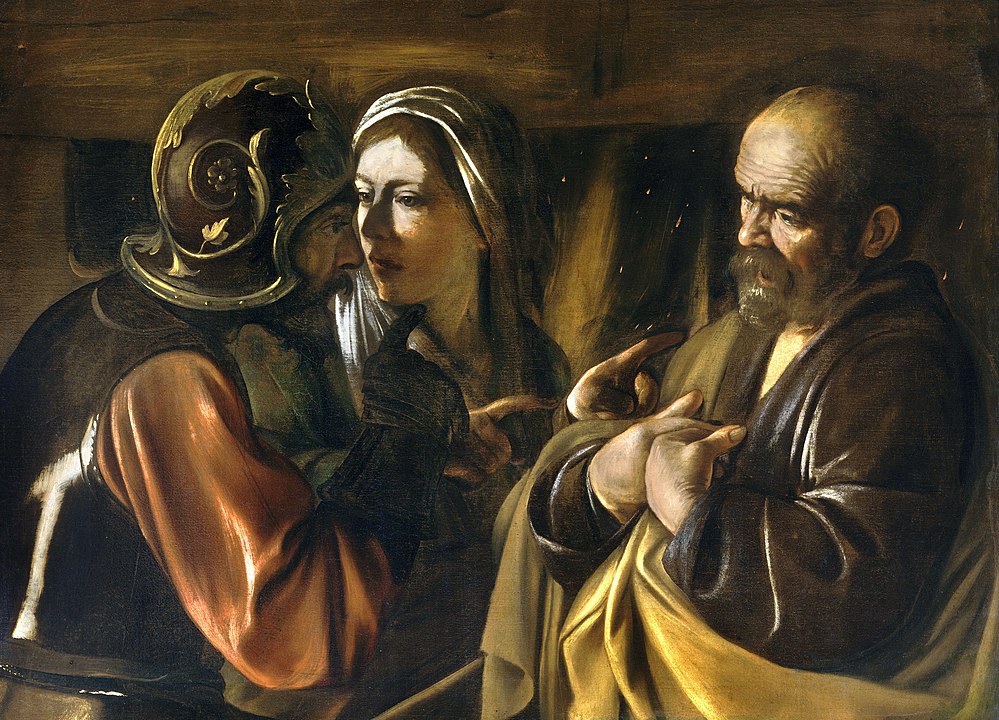And this is Peter, the Rock, who gets his name from Jesus himself because he speaks up under the inspiration of the Holy Spirit and names Jesus Son of God and Messiah. You, Simon, are the Rock, Jesus tells him. On you, the Rock, I will build my church, and Hell itself will not stand against this church’s onslaught.
Tonight, under questioning, at the edge of the scene, the Rock crumbles. Whether Jesus did not meet his expectations of the Messiah, or whether Peter did not live up to his own hopes for himself of bravery and loyalty, Peter fails. Denial of those we know and love is a hard sin because it is a denial of ourselves. “It’s not me. You’ve got the wrong guy,” Peter says. But it was him. And he is denying himself.
Good Friday is the eternal trial of an inconstant and wavering human nature placed side by side with the constant and unwavering love of God.
In the reading from the Prophet Isaiah today, we hear God’s servant shown forth as one who “had no form or majesty that we should look at him, nothing in his appearance that we should desire him.”
The servant was despised and rejected by others; a man of suffering and acquainted with infirmity; “and as one from whom others hide their faces he was despised, and we held him of no account.”
This one who is despised and rejected, who must be turned from in horror, turns out to be God’s own servant. Far from being cursed and outcast by God, the servant turns out to be the one who is carrying the sins of all, bearing the burdens, even pleading for those who taunt and abuse him. You will see the Servant, says the prophet. You will most definitely see him. But you will not like him. You will not cleave to him. You will look away and pretend you don’t know him.
This is a powerful human instinct. We are animals who are fine-tuned to recognize danger. We have a keen eye for who is winning and who is losing. We know when to flee the scene, when to hide, when to pretend we have nothing to do with all this mess. That’s all Peter is doing. That’s all the rest of the disciples are doing as they see the winds change and run for cover. “Not me!” Get out, get safe, make arrangements to live and fight another day.
But we can only do this to each other at a high cost. As soon as the cock crows, Peter weeps. The terrible weight of his disloyalty crashes down on him in an instant. A minute ago he would have run away long before if he could have. Now, if he could, he would take back those denials. He would own his love and bear the cost. So he weeps as his broken heart flutters back to its Lord. That moment, Lord, is not me.
It is the same man who denies and who weeps. That’s discipleship in a nutshell. We change, we hide, we flee, we weep with tears of repentance. We hide our face from God and then run back.
And this is why salvation is not won by ourselves, for ourselves. If we could bear our own sins and the flutter of our hearts, we would have to. There would be no alternative. There would be no grace and no mercy. Peter’s denial would be final. He had come to the critical moment, he had failed, and that failure would haunt the rest of his life, if he had to be responsible for his own salvation. I would have been a door he walked through and that locked behind him, never to open again.
But Peter does not bear his own sins. You and I do not bear our own sins. Jesus does. Peter can now say, and know, “it was not me who saved my soul.” If it depended on Peter the Rock, or James or John the Beloved or you or me, all would be lost. But it wasn’t Peter or James or John or you or me. It was Jesus.
This abandoned and betrayed and denied and forsaken and accursed Jesus bears his own cross all the way to the end because no one else can save their own souls. No one else can rest secure in God’s love. No one else can ever say of anything, “It is finished.” No one else can show perfect loyalty to those who hate and abandon and abuse him. The world turns away in horror and he loves us all the more. The world spits and kicks and just goes about its business and each wound of malice or neglect opens into an infinite ocean of love. It wasn’t me. It was him. It was Jesus. Jesus who loved me despite all, who bore my sins and infirmities, and who prayed for Peter, and you, and me, even when we did not know him.
Amen.


 RSS Feed
RSS Feed